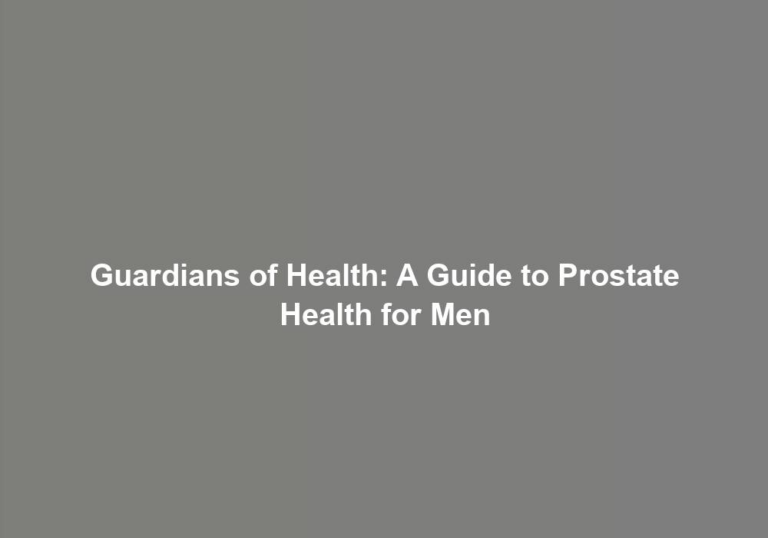Diet and Prostate Health: Making Smart Dietary Choices
So, youG??ve probably heard the phrase G??you are what you eatG?? countless times, but when it comes to your prostate health, the truth behind this statement becomes all the more relevant. Making smart dietary choices can significantly impact your prostate health, and the good news is that itG??s entirely within your control. But before you start revamping your entire grocery list, itG??s crucial to understand the intricate relationship between diet and prostate health. Want to know how simple adjustments in your diet can potentially make a world of difference for your prostate? Stay tuned.
Understanding Prostate Health
Understanding prostate health is crucial for men of all ages to maintain their overall well-being and quality of life. Prostate cancer is a significant concern, being one of the most common cancers among men. Age, family history, and race are important risk factors for prostate cancer. Men over the age of 50, those with a family history of prostate cancer, and African American men are at higher risk. It is vital for men to be aware of these risk factors and to discuss screening options with their healthcare provider.
Prostate enlargement, also known as benign prostatic hyperplasia (BPH), is another common condition that affects men as they age. It can lead to bothersome urinary symptoms such as frequent urination, weak urine stream, or difficulty starting and stopping urination. While BPH is non-cancerous, its symptoms can have a significant impact on quality of life. Understanding the symptoms of prostate enlargement and seeking appropriate medical advice is crucial for managing this condition effectively.
Being informed about prostate health is essential for making proactive decisions about lifestyle and dietary choices. Research suggests that a diet rich in fruits, vegetables, and healthy fats may contribute to a lower risk of prostate cancer and improved prostate health. Regular physical activity is also associated with a reduced risk of developing advanced prostate cancer. By understanding the risk factors for prostate cancer, symptoms of prostate enlargement, and the impact of lifestyle choices, men can take proactive steps to support their prostate health and overall well-being.
Impact of Diet on Prostate Health
Maintaining a prostate-healthy diet can play a pivotal role in mitigating the risk factors associated with prostate cancer and benign prostatic hyperplasia (BPH). Dietary patterns have been extensively studied in relation to prostate health, with evidence suggesting that a diet high in fruits, vegetables, and whole grains, and low in red and processed meats, may reduce the risk of developing prostate cancer. Additionally, nutritional supplements such as vitamin D, lycopene, and omega-3 fatty acids have shown promising effects in supporting prostate health.
Research has indicated that certain dietary patterns, such as the Mediterranean diet, which is rich in plant-based foods, healthy fats, and lean proteins, may contribute to a lower risk of prostate cancer and BPH. Conversely, diets high in saturated fats and sugars have been associated with an increased risk of prostate cancer and disease progression. Therefore, making smart dietary choices by incorporating nutrient-dense foods and limiting the intake of unhealthy fats and sugars is crucial for maintaining prostate health.
Nutritional supplements, when used in conjunction with a balanced diet, may also have a positive impact on prostate health. For instance, vitamin D has been linked to a lower risk of aggressive prostate cancer, while lycopene, found in tomatoes and other red fruits, has been associated with potential protective effects against prostate cancer. Omega-3 fatty acids, commonly found in fish and nuts, have demonstrated anti-inflammatory properties that could benefit prostate health.
Key Nutrients for Prostate Support
When supporting prostate health, itG??s important to ensure you are obtaining key nutrients through your diet and possibly with the use of supplements. Certain nutrients have been linked to prostate health, and incorporating them into your diet can be beneficial. Here are some key nutrients and their food sources that you should consider:
| Nutrient | Food Sources |
|---|---|
| Vitamin D | Fatty fish (salmon, mackerel), fortified milk, eggs, sunlight |
| Zinc | Oysters, beef, pumpkin seeds, lentils, cashews |
| Selenium | Brazil nuts, sunflower seeds, turkey, beef, eggs |
| Omega-3 Fatty Acids | Flaxseeds, chia seeds, walnuts, salmon, sardines |
In addition to obtaining these nutrients through your diet, you may also consider prostate supplements. Supplements such as saw palmetto, beta-sitosterol, and pygeum are commonly used to support prostate health. However, itG??s important to consult with a healthcare professional before starting any new supplement regimen.
Furthermore, incorporating healthy fats into your diet is essential for prostate health. Healthy fats, such as those found in avocados, nuts, seeds, and olive oil, can help reduce inflammation and provide important nutrients for overall prostate support.
Foods to Include for Prostate Health
Incorporate a variety of colorful fruits and vegetables into your diet to support prostate health. Consuming a wide range of fruits and vegetables provides essential vitamins, minerals, and antioxidants that help maintain a healthy prostate. Include foods such as tomatoes, bell peppers, broccoli, and berries, which are rich in nutrients like vitamin C, vitamin E, and lycopene known for their prostate-protective properties. Additionally, cruciferous vegetables like broccoli, cauliflower, and Brussels sprouts contain compounds that support prostate health.
Incorporating fish into your diet is also beneficial. Fatty fish such as salmon, trout, and sardines are excellent sources of omega-3 fatty acids, which have anti-inflammatory properties and may help reduce the risk of prostate cancer. Furthermore, nuts and seeds like almonds, walnuts, flaxseeds, and chia seeds are rich in omega-3 fatty acids and can be easily added to your meals to promote prostate health.
Moreover, consider incorporating prostate-friendly recipes into your meal planning. These recipes often feature ingredients that are specifically beneficial for prostate health, making it easier to maintain a balanced diet. Additionally, nutritional supplements like saw palmetto, pygeum, and beta-sitosterol have been studied for their potential to support prostate health. However, itG??s important to consult with a healthcare professional before adding any supplements to your routine, as they may interact with medications or have potential side effects. By incorporating these foods and supplements into your diet, you can actively support your prostate health.
Foods to Avoid for Prostate Health
To promote optimal prostate health, it is essential to limit the consumption of red and processed meats in your diet. Red meat and high-fat dairy products have been associated with an increased risk of prostate cancer and other prostate health issues. Additionally, processed foods and excessive alcohol consumption can also have negative effects on prostate health. Here are some dietary choices to consider avoiding for the sake of your prostate health:
-
Red Meat and High-Fat Dairy: Red meat, such as beef, pork, and lamb, and high-fat dairy products like whole milk and cheese, contain high levels of saturated fats which can contribute to inflammation and other prostate health concerns.
-
Processed Foods: Foods that are highly processed, such as fast food, sugary snacks, and pre-packaged meals, often contain high levels of unhealthy fats, sugars, and additives that can negatively impact prostate health.
-
Alcohol: Excessive alcohol consumption can lead to dehydration and inflammation in the body, compromising prostate health.
Making smart dietary choices can play a significant role in promoting prostate health. By limiting the intake of these foods, you can take proactive steps to support your overall well-being. Remember that while these dietary choices can be beneficial for prostate health, itG??s essential to consult with a healthcare professional for personalized dietary recommendations.
Conclusion
So, next time youG??re at the grocery store, remember to pick up some broccoli and salmon for your prostate health. And while youG??re at it, maybe skip the processed meats and sugary drinks. Your prostate will thank you for making smart dietary choices. With the right nutrients and foods, you can support your prostate health and overall well-being. ItG??s as simple as making the right choices at mealtime.







